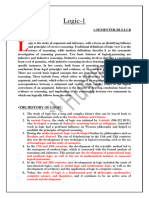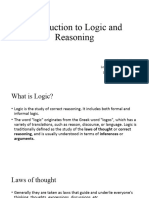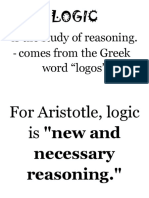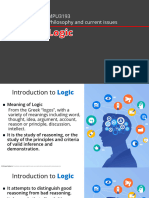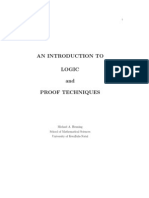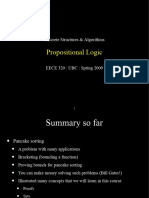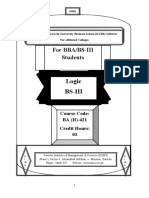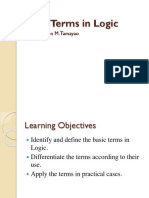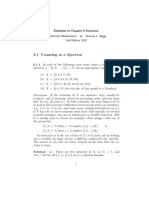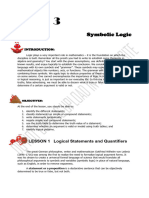Week# 2
Mathematical Reasoning & Logic
Dr Taimur Ahmed
�Revision of Lecture# 2
❑ Reasoning
➢ The action of thinking about something in a logical, sensible way
❑ Types of Reasoning
➢ Inductive Reasoning
❖ Based on observations
❖ Specific arguments to Generalized conclusion
➢ Deductive Reasoning
❖ Based on Hypothesis
❖ Generalized arguments to Specific conclusion
Lecture# 3 – Logic | 2
�Lecture# 3
Logic
�Basic Terminology
❑ Reasoning: The action of thinking about something in a logical, sensible way.
(Argument)
❑ Statement: It is a declarative sentence that is either true or false but not both.
❑ Proposition: A statement or assertion that expresses a judgment or opinion.
❑ Inference ()اندازہ: A conclusion based on evidence and reasoning.
❑ Fallacy ()غلط فہمی: A mistaken belief, especially one based on unsound argument. A
Misconception resulting from incorrect reasoning.
❑ Premises ()احاطہ: A premise is a statement in an argument that provides reason or
support for the conclusion. There can be one or many premises in a single argument.
Lecture# 3 – Logic | 4
�What is Logic?
❑ Study of the principles and methods that distinguish between a valid
and invalid argument
❑ Logic is the study or science of correct processes or reasoning
❑ Basis for making correct sentences
❑ Crucial for mathematical reasoning
❑ Important for program design/problem solving
❑ Logic helps to construct a valid argument (proofs)
❑ Help us to understand and reason about mathematical statements
Lecture# 3 – Logic | 5
�Types of Logic
❑ Informal Logic: represents arguments in natural languages
❑ Formal Logic: reasoning is used
❑ Propositional Logic (Logic): based on propositions (Boolean Logic)
❑ Predicate Logic: extension of propositional logic covering predicates
and quantification, also known as First-Order Logic
❑ Symbolic Logic: Propositional + Predicate
❑ Fuzzy Logic: that allows partial truth
Lecture# 3 – Logic | 6
�Types of Logic: Informal Logic
❑ It is the study of natural language arguments
❑ It is used in daily reasoning
❑ The reasoning and arguments you make in your personal dialogues
with others
❑ Loose guidelines or rules
Lecture# 3 – Logic | 7
�Types of Logic: Informal Logic
Example 1:
Premises: Ali saw a black cat on his way to work. At work, Ali got fired.
Conclusion: Black cats are bad luck.
Explanation: This is a big generalization and can’t be verified.
Lecture# 3 – Logic | 8
�Types of Logic: Informal Logic
Example 2:
Premises: There is no evidence that corona vaccine is bad for you.
I got vaccinated without any problems.
Conclusion: Corona vaccine is safe for everyone.
Explanation: The personal experience here isn’t verifiable.
Lecture# 3 – Logic | 9
�Types of Logic: Formal Logic
❑ The study of inference with purely formal and explicit
contents
❑ Deductive reasoning is used
❑ The premises must be true. Follow the premises to reach a
formal conclusion.
❑ Follows rules
Lecture# 3 – Logic | 10
�Types of Logic: Formal Logic
Example 1:
Premises: Every person who lives in Islamabad lives in Pakistan. Everyone
in Pakistan lives in Asia.
Conclusion: Every person who lives in Islamabad lives in Asia.
Explanation: Only true facts are presented here.
Lecture# 3 – Logic | 11
�Types of Logic: Formal Logic
Example 2:
Premises: Bicycles have two wheels. Ahmed is riding a bicycle.
Conclusion: : Ahmed is riding on two wheels.
Explanation: The premises are true and so is the conclusion.
Lecture# 3 – Logic | 12



















